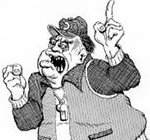For the first few years here, spring always blew in a fresh batch of projects: pasture renovation, building fences, making garden plots, directing water away from the house, enlarging our solar power system, fixing barns, buying chickens, pigs, lambs, and cattle and wondering when we were ever going to find the time to do it all.
Raising cattle meant we had to build over a thousand feet of split-rail fence. So, for several weeks we dismantled old rail fence wherever we could buy the rails and scoured the countryside for more. I found a father/son team to build most of the fence while I hammered together 12 wooden gates, sunk gateposts, and tried to figure out the best arrangement of pastures.
Intensive rotational grazing is usually the most efficient use of space for small holdings. The animals are rotated through several small paddocks, grazing each in turn with enough paddocks to give the first a rest of 45 -60 days before the whole rotation starts again.
There were lots of details: what paddock sizes and shapes best fit the natural landscape and retained the airstrip the former owner used for his ultralight airplane; where the gates should be for the proper flow from one pasture to the next (in the corner is always best) without impeding our own movement around the farm; which way the gates should open; what kind of hinges and latch arrangements; how to get water to each paddock.
My neighbor Jack was over one day helping me dig gatepost holes. He started telling me a bit about the man who originally homesteaded our place.
“Chester McKeen settled all the land around here,” said Jack, “At one time he took care of hundreds of acres. He lived in a tarpaper shack right out in front of where your house stands now. It had a dirt floor and as the walls rotted away he just piled the dirt a little higher. When he finally moved to town, the dirt was up past the window sills.
“He had nice cattle here, two hundred head of Herefords, and a bull named Bigger. Well, Bigger used to push his nose against the windows of that shack, then Chester would say, “Bigger wants to take me for a ride.” He would climb aboard that bull and be carried all around this farm. I don’t know who liked it most – the bull or Chester.
“I used to come up and visit with him, sit on the stoop of his shack in the summer with the cattle and chickens in the front yard. It was nice here then, peaceful, no one else around. Still is. I think this is the nicest place on the road, and I always have a soft spot in my heart for it.
“The first time I came here, I was about eight or nine. My Dad was delivering a load of hay, and I expected to unload it and leave. Well, Chester didn’t get much company and he insisted on making us tea. Then he reached up on a top shelf and brought down a box of cookies and gave me two. They were so old and hard it was like trying to eat shingles. By the time we left four hours later, I had managed to break them up and hide them in my pocket. Good thing he only gave me two, but I guess it was the thought that counted.
“Chester lived mostly on beef, smoked pork, huckleberries, and game. Smoked pork was easy to keep and he was good at finding huckleberries and a first-class hunter. He used to shoot a single-shot .222, not much of a gun, but he always used to say, “It only takes one shot.”
“He was tough enough, too. One day, way out here, two young guys stopped by and thought they would have some fun and give him some trouble. Chester grabbed one of them and beat him up bad, dragged him down by the road and rubbed his face in the gravel for a while. The other one didn’t want any of that and loaded his friend in the truck and took off. And Chester wasn’t a young man, maybe 65 at the time.”
Thursday, July 19, 2007
Subscribe to:
Post Comments (Atom)







No comments:
Post a Comment